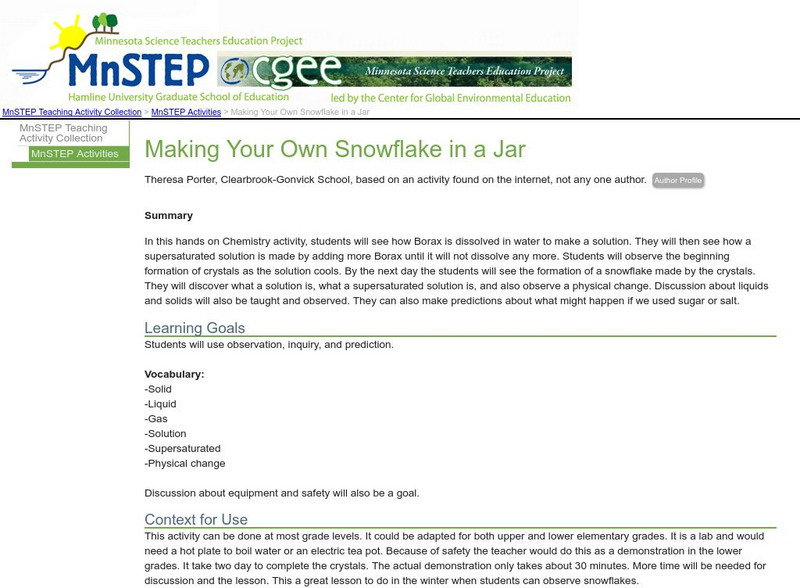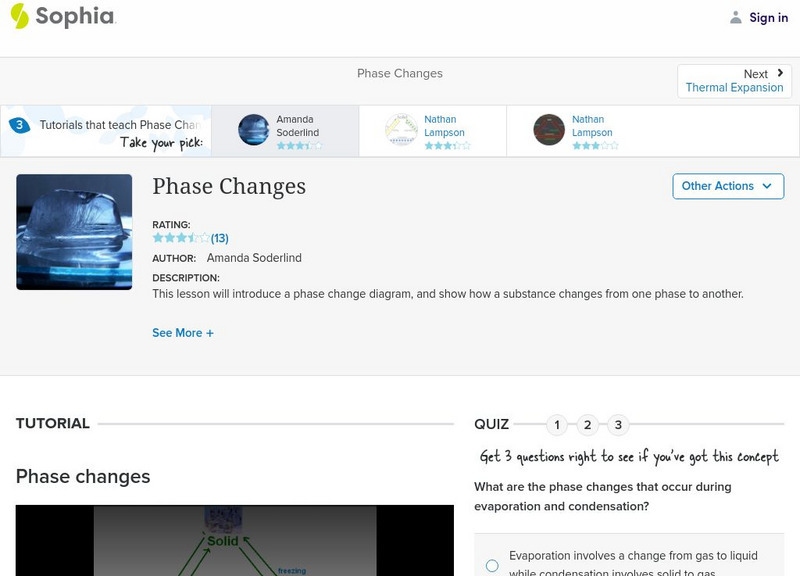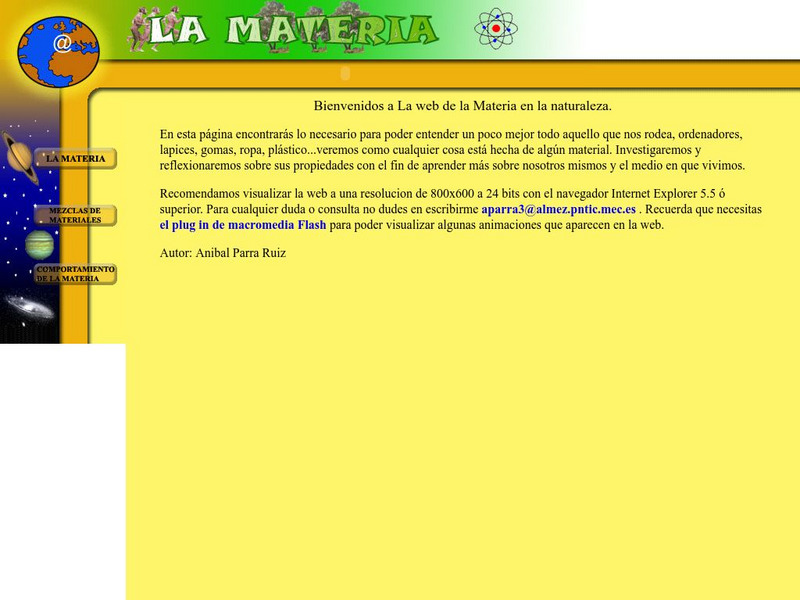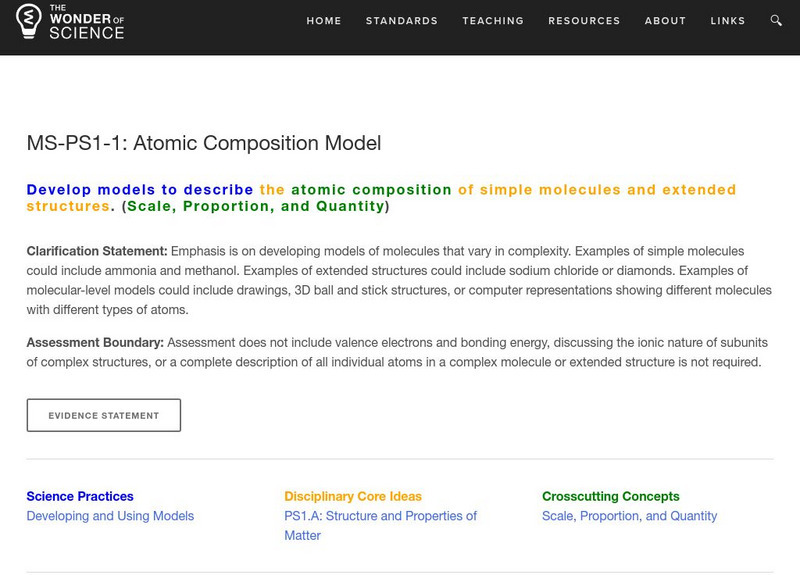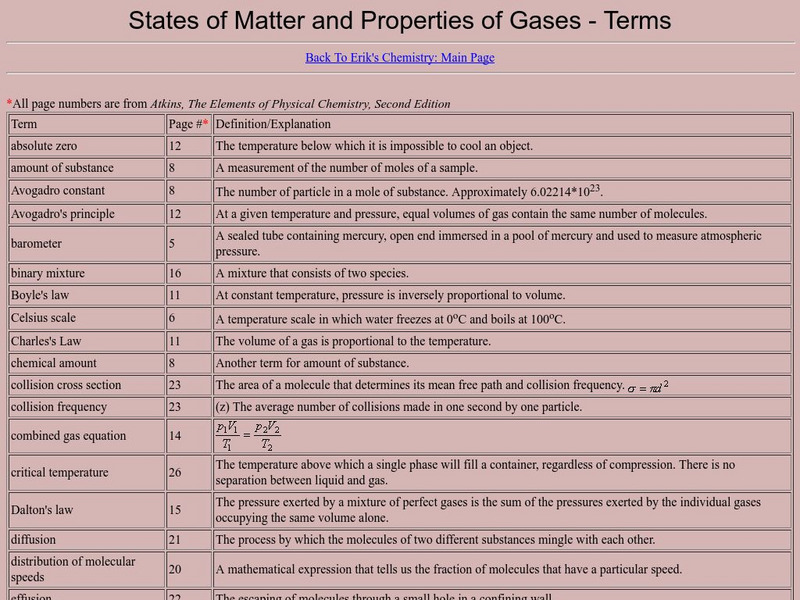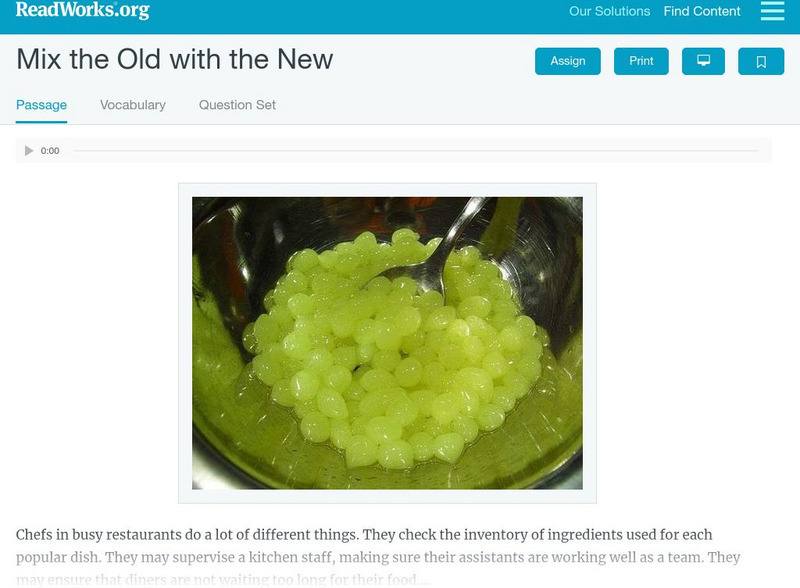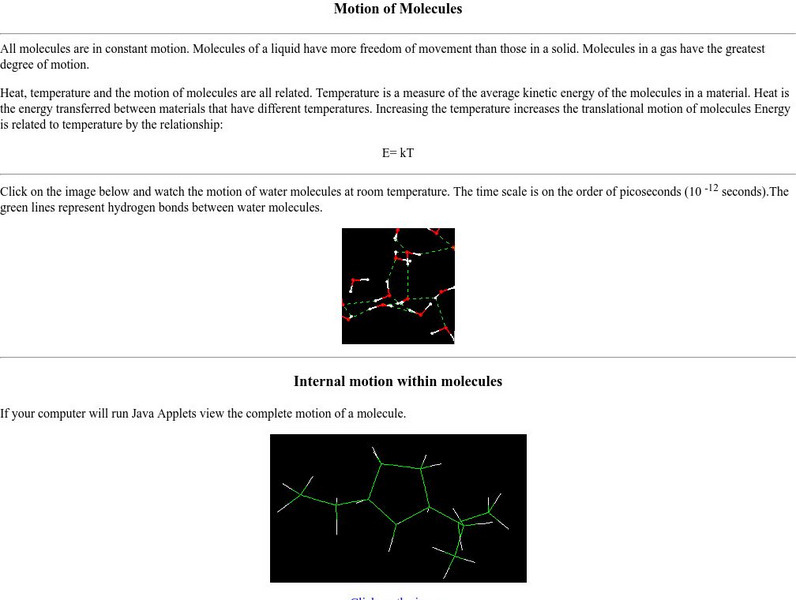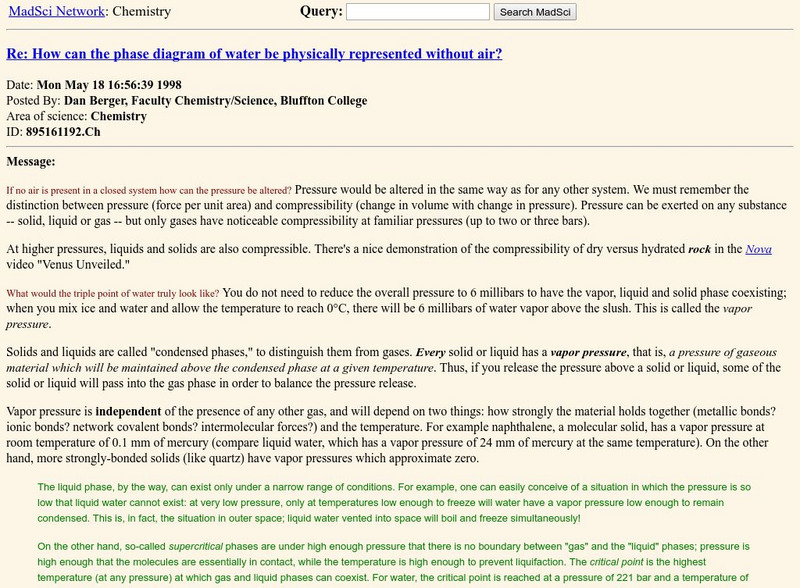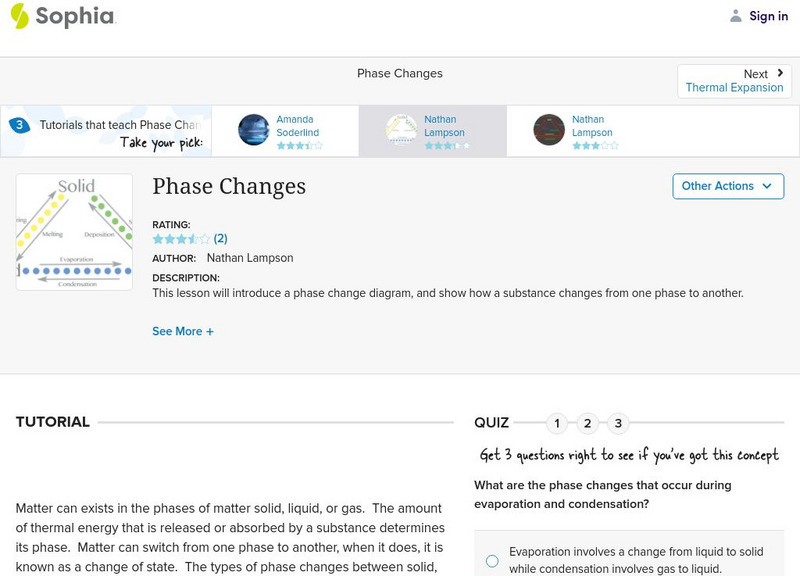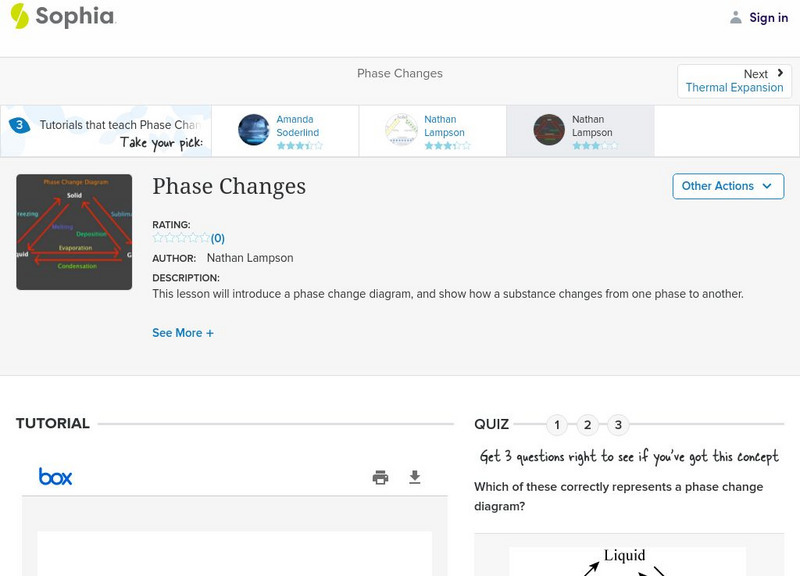Hi, what do you want to do?
Chem Tutor
Chem Tutor: States of Matter
A very descriptive site that allows students to understand the different states of matter at the atomic level. Also discusses the process of phase changes and displays phase change graphs. Thermochemistry is also touched upon for high...
Center of Science and Industry
Cosi Columbus: Can You Stand the Pressure
Science experiment that demonstrates the four states or phases of matter: solid, liquid, gas, and plasma. Includes full list of materials, procedures, and scientific explanation of how you change water from a liquid state to a gaseous...
ABCya
Ab Cya: Hydro Logic
Hydro Logic is a splashy puzzle game that teaches the Water Cycle, also known as the Hydrologic Cycle! Navigate our wet little friend Enki to the goal in each level. Enki is liquid at room temperature, but can transform into gas and...
McREL International
Mc Rel International: Timss 2007 Released Items: Science Fourth Grade [Pdf]
A released question from the Trends in International Mathematics and Science Study (TIMSS) assessment about change of states of matter. Also included is a scoring guide for the released question.
E-learning for Kids
E Learning for Kids: Science: Norway: What Is Matter Made Of?
Set sail with Oleif, the Viking. Make his boat move by learning all about matter and particles.
Science Education Resource Center at Carleton College
Serc: Making Your Own Snowflake in a Jar
In this activity, students will learn about supersaturated solutions. They will observe the beginning formation of crystals as the solution cools and by the next day, the students will see the formation of a snowflake made by the crystals.
Crescent Public Schools
The Internet Science Room: The Kinetic Theory & Phase Change
This tutorial helps students understand the Kinetic Theory, which explains the effects of temperature and pressure on matter as it goes through phase changes.
Wikimedia
Wikipedia: Materia
Explore the concept of matter in this Spanish-language encyclopedia entry. This site features the properties of matter, the Law of Conservation of Matter, and other important features of matter.
Sophia Learning
Sophia: Phase Changes: Lesson 1
This lesson will introduce a phase change diagram, and show how a substance changes from one phase to another. It is 1 of 3 in the series titled "Phase Changes."
University of Florida
Chem. 2041 Lecture Notes: The Forces Between Molecules
A discussion of the variety of forces which hold molecules together. The relative strengths of these forces for the various states of matter is discussed. The effect of such forces on the boiling points and other phase change...
Museum of Science
The Atom's Family: Mighty Molecules
In this activity, students construct models of molecules using marshmallows and gum drops.
Chem Tutor
Chemtutor: Heating Curve Problems
Nice set of problems dealing with the concept of a heating curve. Students can click on the question and get immediate feedback on their answer.
New York University
Nyu: Welcome to Water
Educational resource invites users to understand the properties of water by first examining what water is and how we use it and then leads users to further information on the three states that water can exist.
Ministerio de Educación (Spain)
Ministerio De Educacion: La Materia
In this site you can learn and experiment with matter properties and change in behavior. Every theoretical explanation is accompanied by an animation. You will be able to aply the theory to real experiments.
Scholastic
Scholastic: Study Jams! Science: Matter: Periodic Table
A video and a short quiz on the periodic table of elements and how it is organized.
Other
King's Centre for Visualization in Science: Scientific Models
A series of interactive applets use scientific models to teach some basic concepts of matter, including states of matter and physical and chemical changes.
The Wonder of Science
The Wonder of Science: Ms Ps1 1: Atomic Composition Model
A collection of lesson plans for helping students understand atomic composition. Site uses work samples, phenomena, assessment templates, and videos to plan lessons to describe the atomic composition of simple molecules.
Other
States of Matter and Properties of Gases: Terms
A very complete list of terms that are important to the study of gases. This resource is a web archive.
Read Works
Read Works: Mix the Old With the New
[Free Registration/Login Required] An informational text about how cooking causes changes in matter. A question sheet is available to help students build skills in reading comprehension.
New York University
Nyu: Math Mol: Motion of Molecules
Examine the link between molecular motion and energy. Observe the movement of a molecule at room temperature. Learn about the different types of molecular motion.
MadSci Network
The Mad Scientist Network: Chemistry
The question: "What would the triple point of water truly look like?" is discussed and explained. The phases of matter are described.
Sophia Learning
Sophia: Phase Changes: Lesson 3
This lesson will introduce a phase change diagram, and show how a substance changes from one phase to another. It is 3 of 3 in the series titled "Phase Changes."
Sophia Learning
Sophia: Phase Changes: Lesson 2
This lesson will introduce a phase change diagram, and show how a substance changes from one phase to another. It is 2 of 3 in the series titled "Phase Changes."
Other
Teaching Ideas for Primary Teachers: Science Ideas
A great resource to discover fun new activities to use in your classroom. Activities are age-appropriate, and span several science topics.
Other popular searches
- Solids Liquids and Gases
- Solids, Liquids and Gases
- Solids, Liquids, and Gases
- Solids Liquids and Gasses
- Solids, Liquids and Gasses
- Liquids Solids and Gas
- Solid,s Liquids and Gases
- Liquids, Solids and Gases







